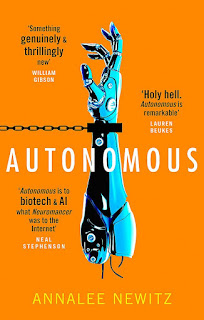Autonomous - Annalee Newitz
The conflict that represents the main dilemma is one that Jack has been struggling with for a long time; the use of drugs and the dominance of Big Pharma to control their use and distribution. Known as Jack, former genetic engineer undergraduate Judith Chen’s response to the control of potentially life-saving drugs is a moral one, and she has resorted to anti-patent piracy, reverse-engineering products and making them available to the general public for free. There are risks involved not only from the legal viewpoint, but also working with the drugs that affect and potentially alter human neural activities. One such piracy release has left her with just such a dilemma, putting a performance enhancing drug called Zacuity out on the market that is having an extreme impact on users, leading to a number of deaths. Either the drug hasn’t been properly tested by its developers Zaxy, or the results of its negative effects have been made public. Or perhaps the drug has other purposes that aren’t suitable for general public use…
Jack isn’t usually so careless with her piracy activities and sets out to try and fix things, understand what has gone wrong with the drug and see if there is a way of fixing the problem. Aside from the trouble and damaging headlines it is causing, the need to fix things is rather more urgent as Jack knows that the pharmaceutical group who have been secretly preparing this drug will want to cover up any negative press that might be traced back to them, and they have the means to do so. In 2144, advanced human-like and military robots are in common use, and despite having some measure of autonomous thought and behaviour, most are indentured for a specific period to the corporations and federations who have created them. Paladin is one such indentured bot for the International Property Coalition, and has been teamed up with a human operative Eliasz to track down whoever has illegally released Zacuity on the market. Jack knows someone will be coming from her and time is against her, but she has picked up a few bots and friends along the way who might be able to solve the problem and make it public before Paladin and Eliasz get to her.
If the first question posed by Autonomous is a human one relating to the moral question of the use of science to develop lifesaving drugs and the impact – intentional and incidental – and the struggle to wrest such control away from Big Pharma, the second question matter that somewhat complicates the question is the relationship between humans and artificial intelligence. The question of ‘indenture’ or enslavement is the one of the most likely consequences of such a relationship. In Autonomous, and from the perspective of Paladin, who has not yet had the experience to fully understand human behaviour, this relationship takes an unusual form in the confusing area of human and robot sexuality that he becomes aware of when in close contact with his mission operative team-mate Eliasz. The attempt to unravel the complex feelings of attraction between robots and humans seems like a rather unusual point to devote so much attention to, as it seems entirely unrelated to the Zacuity Big Pharma conspiracy plotline, but there is a deeper purpose here that eventually becomes apparent.
And it’s a point that is worth waiting for and worth persevering with, even when it seems that Autonomous is going to be not much more than a long drawn out chase between government officials trying to track down a suspected felon by following a path of her known associates. As well as maintaining an element of danger and adventure that keeps the action moving along, the writing and the interactions between the characters – as uncomfortable and unusual as it might occasionally seem – also manages to give a good sense of the nature of the future world that Annalee Newitz wants to explore. What comes out of those uncomfortable relationships, and the backgrounds that the characters have lived through, is the complicated nature of indenture or enslavement as something that affects not just robots, but humans chained and bound to the capitalist system as well. In that respect, like all good science-fiction, Autonomous has something to say about how we live today as much as it presents a warning about the future.
Autonomous by Annalee Newitz is published in paperback by Orbit on 15 March 2018. It’s available in eBook format now.




Comments
Post a Comment